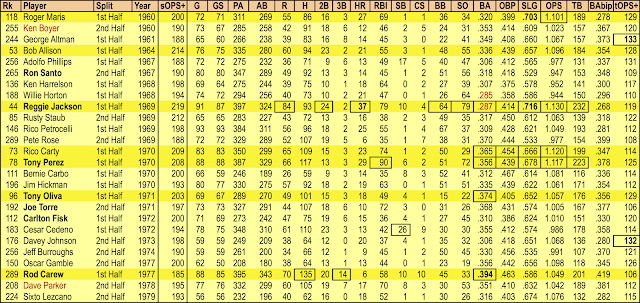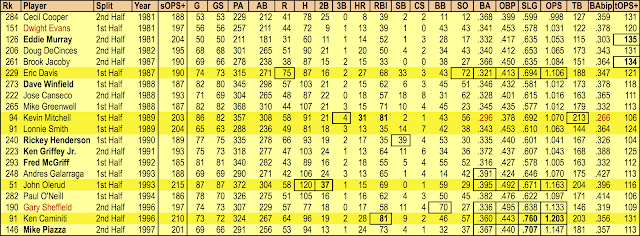WE continue with the high-flying soloists from the master list of our two Top 300 lists from first-half & second-half performances since 1901. We pick up the trail again starting with the 1960s-70s:
You'll remember Roger Maris from our .700+ SLG list. This was Roger's best stretch in his career, and it occurred the year before he hit 61 homers. The offensive downturn in the 60s gives us some off-beat folk that might not seem to fit into such a list, but that's part of what makes this so interesting: you're not really expecting to see George Altman or Adolfo Phillips in such a list, but here they are. Ken Harrelson and Willie Horton do a good job of defying the Year of the Pitcher (1968), at least for half the year; in '69 Pete Rose keeps the single-digit HR performance from going the way of the Dodo bird with his spiffy closing kick that netted him a batting title. Reggie Jackson's first half that same season has one of the highest ISOBA (ratio of isolated power to batting average) rankings ever (.429/.287 = 1.494).
1970 starts the new decade off with a bang thanks to the intense firepower of Rico Carty and Tony Perez, both who push into the Top 100 thanks to some heavy all-around hitting. Perez's teammate, rookie outfielder Bernie Carbo, adds some extra offensive dimension that helps propel the Reds to a 70-30 start to the season. Carlton Fisk and Cesar Cedeño both looked like future Hall of Famers in the first half of 1973; only one of them wound up making it. Rod Carew, on his way to an MVP season in 1977, slaps 14 triples and hits 394 in the first half, the closest to .400 anyone would get in this two-decade slice. Our main man Sixto Lezcano quietly ruled the world in July-August of '79, falling back into the 200's on the list due to a September fadeaway.
Many intriguing one-timers here, both well-known and obscure: six Hall of Famers and two (Dwight Evans and Gary Sheffield) with strong cases for induction. Among the others, Eric Davis' first half in 1987, with its astonishing blend of speed (33 SB) and power (27 HR) stands out despite the relatively low BA; Kevin Mitchell's 31 first-half HRs in 1989 probably helped him win an MVP Award that Bill James still insists belongs to Will Clark (alas, nowhere to be found in these peak performances). In that same year Lonnie (Skates) Smith's first half actually ranks higher on the all-time list than Mitchell's big-fly-driven dominance.
In the 90s, Andres Galarraga discovers that the air is just fine at 5,000+ feet; but his high-altitude feats are dwarfed by the incredible first-half performance of John Olerud, who nearly cracked the Top 50 with his old-style combination of high BA, moderate XBH, and excellent batting eye. A similar template worked for Paul O'Neill in 1994--his subsequent deep slump after the ASB was curtailed by the strike, permitting him to retain the batting title. By the middle of the decade power (and substances obtained to boost it) were inching into notoriety--we'll never know exactly what role those performance enhancers played in the numbers put up by Ken Caminiti and Mike Piazza, two men who tried to single-handedly carry their teams into the post-season (only one succeeded).
The only father-and-son combination on these lists emerges with Vlad Guerrero and his namesake, making their appearances here nineteen years apart. (It's still possible, even likely, that Vlad Jr. will become more than a one-timer.) The names of journeyman semi-stars having a three-month supernova are more plentiful here than in any of our other lists: Luis Gonzalez, J. T. Snow, Travis Hafner, Mike Napoli, Jayson Worth come to mind. Also here are folk who looked to be superstars but faded away for one reason or another: Ryan Howard, Josh Hamilton, Troy Tulowitzki, Edwin Encarnacion, Alex Bregman, Cody Bellinger. Snow and Justin Turner prove that it's still theoretically possible to make these lists without hitting a lot of HRs, but it helps if your half-season just barely crosses over our (somewhat generous) 200 PA threshold.
We'll hold off with a correlation of these seasons to MVP Awards until we complete our roundup of Top 600 seasons, which will continue with the "repeat offenders." The "two-timing" guys are up next...


